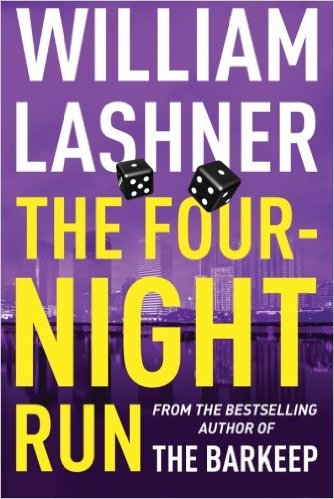The Four-Night Run by William Lashner
 By Rick Reed
By Rick Reed
William Lashner served as a prosecutor for the Department of Justice in Washington, D.C., until he became a full-time thriller writer. This New York Times bestselling writer is the author of the Victor Carl series, which has been translated into more than a dozen languages, and such standalones as The Barkeep, which was shortlisted for an Edgar Award.
His skills as a lawyer shine through in his new standalone novel. THE FOUR-NIGHT RUN features criminal lawyer J. D. Scrbacek. He has just won the biggest trial of his career when an explosion cuts the celebration short. Was the bomb meant for him? Was it meant for his mobster client? No one in this seaside casino town knows for sure, but the smart money is on Scrbacek.
Scrbacek flees into a part of town known as Crapstown. Here he is forced to argue for his life before a jury of the forgotten and damned who have taken up residence in the underbelly of the city. The question becomes whether Scrbacek is lawyer enough to save his own skin. The answer to that question lies somewhere in his past, or possibly his sordid present.
What was your first experience with being a published writer? How did that experience influence your future writing?
The first time I stepped into my new editor’s office, she began telling me a story of a woman whose novel the editor liked but who refused to make changes and so the editor passed on the book and when it came out, it flopped. The editor spent a while telling the story, as if it was just something offhand she was talking about, but then she proceeded to tell me about the hole in my book that she had just bought. I got the message.
Maybe as a result, I have always been open and grateful for any editorial critiques. The whole goal of the rewrite—and I love rewriting—is to make the book as good as possible, and my editors are always partners in the process, not adversaries.
Tell us about THE FOUR-NIGHT RUN, your new novel.
I was trying to write a legal thriller with the wildness and scope of a Frank Miller comic book. It’s pretty much a lawyer-on-the-run story that sends the hero through the lower precincts of an old shore town on the East Coast that has sold its soul to the casinos. During the run, the lawyer, one J. D. Scrbacek, has to confront the ghosts of his past, present, and future. It starts with a trial and ends with a trial, and in between is madness.
Do any of the characters in the standalone or Victor Carl thriller series resemble real people you have known? And, of course, are you the Victor Carl in your books?
There is always something familiar to me that sparks a character, but I’m a bit of a magpie, taking a bit here or there and using that to build the whole. But even if they start off based on one person, eventually my characters start building themselves in the writing and that’s when they start to work. Until that happens I’m worried. Victor is definitely within me, but I leave out the less interesting parts. He’s braver than I am, more desperate, lonelier, nobler, and much funnier.
Do you keep a list of people—a character bank—that you use, or are going to use, in your books—killers, victims, street people, etc.? How do you create characters?
No bank, no list. I start with some idea of what I have in mind, but it always changes in the writing. Sometimes I go online and look at pictures of people, and the pictures spark something. Sometimes there is a line of dialogue that just appears but so captures the character I have to rewrite her from the start. Sometimes I just give them room to talk and talk and things come out and then I cut all the uninteresting stuff.
THE FOUR-NIGHT RUN is your most recent standalone thriller. How difficult, or easy, do you find it to keep coming up with plots, characters, and endings?
The characters and plots go together. I don’t have a plot without a character that works for it. I get a lot of ideas and I put them down in my idea journal, but I won’t start writing until I have the right antagonist and an ending that works. It’s a lot easier finding an idea than finding an antagonist and an ending.
What authors influenced your writing style?
I’ll mention the books, because they are more influential than the writers themselves. Red Harvest, All the King’s Men, Devil in the Blue Dress, On the Road, Rebeca, Farewell My Lovely, Waterland, and Lord of the Rings. I’m most affected by books where the writing style and the storytelling work together seamlessly. I try to emulate that.
What kind of research do you do to write thrillers?
I love going to the locations, wandering around like a private eye. I did this for THE FOUR-NIGHT RUN, cruising through the wild parts of an old shore town, to get a sense of it. One of the neon signs I saw, with a dancer’s leg kicking up in the air, found its way over one of the strip joints I wrote about. I also get experts in the field and have them look at the pages to see if there is anything I really messed up. I had a great bartender review my bartending pages for THE BARKEEP, and he gave some really valuable comments that changed the book. The best part of research is that you get amazing things that work so well for the story that you couldn’t have imagined otherwise.
How important is a writing routine?
Routine is everything. I find that writing doesn’t just happen, you have to put in the hours, sometimes just sitting there, trying to figure out what’s gone wrong and how to get out of the latest dead end. The solution won’t just arrive while you’re on the softball field or having dinner with friends. It happens because you’ve been taking copious notes and making several lame attempts at a solution while struggling with the issue. Yes, often the answer comes away from the desk, but the work that lays the foundation for the answer comes in the process of working it out.
What is a typical day like in the life of William Lashner, husband, father of two?
Well, the kids are gone now—which sadly happens when they move into their 30’s and you finally kick them out of your basement—and my wife has learned to ignore my anguished cries of despair, so I guess my days now are pretty much taken up with writing, reading, playing guitar, and taking care of my pet fish.
Your many novels have been translated/published in more than a dozen countries/languages. What advice do you have for aspiring or newly published authors?
Learn to finish. Rewriting is a blast, but you can’t rewrite until you finish the thing. Then once you finish, figure out what sucks and make it better. Then do it again. There hasn’t been a book I’ve ever written that I haven’t finished in despair, hoping to save it in the rewrite.
*****
 William Lashner is the New York Times bestselling author of Guaranteed Heroes, The Barkeep, and The Accounting, as well as the Victor Carl legal thrillers, which have been translated into more than a dozen languages and sold across the globe. The Barkeep, nominated for an Edgar Award, was an Amazon and Digital Book World #1 bestseller. Before retiring from law to write full-time, Lashner was a prosecutor with the Department of Justice in Washington, DC. He is a graduate of the New York University School of Law as well as the Iowa Writers’ Workshop. He lives outside Philadelphia with his wife and three children.
William Lashner is the New York Times bestselling author of Guaranteed Heroes, The Barkeep, and The Accounting, as well as the Victor Carl legal thrillers, which have been translated into more than a dozen languages and sold across the globe. The Barkeep, nominated for an Edgar Award, was an Amazon and Digital Book World #1 bestseller. Before retiring from law to write full-time, Lashner was a prosecutor with the Department of Justice in Washington, DC. He is a graduate of the New York University School of Law as well as the Iowa Writers’ Workshop. He lives outside Philadelphia with his wife and three children.
To learn more about William Lashner and THE FOUR-NIGHT RUN, please visit his website.
- Exit Strategy by Linda L. Richards - May 31, 2022
- Deceived By Ornament by Edward J. Leahy - May 2, 2022
- Headstone’s Folly by Robert J. Randisi - October 31, 2020
